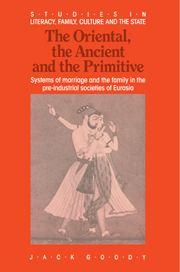 The Oriental, the Ancient and the Primitive
The Oriental, the Ancient and the Primitive Book contents
- Frontmatter
- Contents
- List of illustrations
- List of tables
- Preface
- 1 The nature of the enterprise
- PART I CHINA
- PART II INDIA
- PART III THE NEAR EAST
- PART IV GREECE AND ROME, YESTERDAY AND TODAY
- 13 The heiress in ancient Greece
- 14 Monogamy, property and control in Rome
- 15 Dowry, continuity and change in the eastern Mediterranean
- 16 Asia and Europe
- Notes
- References
- Index
14 - Monogamy, property and control in Rome
Published online by Cambridge University Press: 09 January 2010
- Frontmatter
- Contents
- List of illustrations
- List of tables
- Preface
- 1 The nature of the enterprise
- PART I CHINA
- PART II INDIA
- PART III THE NEAR EAST
- PART IV GREECE AND ROME, YESTERDAY AND TODAY
- 13 The heiress in ancient Greece
- 14 Monogamy, property and control in Rome
- 15 Dowry, continuity and change in the eastern Mediterranean
- 16 Asia and Europe
- Notes
- References
- Index
Summary
In considering marriage prestations and inheritance in China, India, the Near East and ancient Greece we have seen little evidence of that extreme patriliny which is said to involve the complete assimilation of a wife to the agnatic group of her husband either by purchase or by some other form of transfer. In this chapter I look critically at another society, that of Rome, which, at least in its early stages, has often been taken as an extreme example of the incorporation of females combined with strong patriarchal authority (patria potestas) exercised over a joint ‘family’ of living agnates and their dependants. Knowledge of the early period is necessarily fragmentary and uncertain, and has been subject to many changes of interpretation over the past hundred years, the general trend of which I want to sketch out in the way that has been done for ancient Greece, Israel and Arab societies. In seeking to qualify, as others have done, ideas about the position of women regarding property, I raise the question of how far reconstructions of the earlier state of affairs reflect the emergence of written ‘laws’ as distinct from already existing oral norms.
- Type
- Chapter
- Information
- The Oriental, the Ancient and the PrimitiveSystems of Marriage and the Family in the Pre-Industrial Societies of Eurasia, pp. 397 - 428Publisher: Cambridge University PressPrint publication year: 1990


